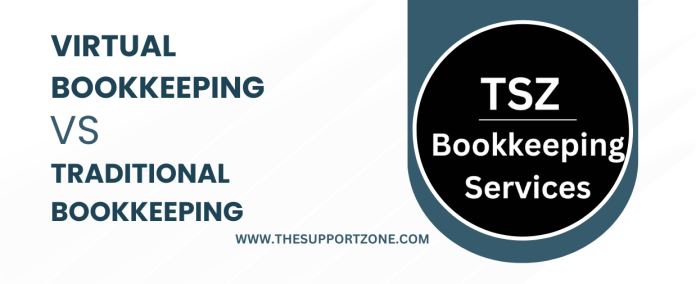Welcome to our exciting exploration into the world of accounting! As technology continues to shape how we manage our finances, it’s time for us to delve deeper into traditional bookkeeping practices compared to their innovative counterparts – virtual bookkeeping methods. Let’s delve into the comparison of Virtual Bookkeeping vs Traditional Bookkeeping to guide you through this decision-making process.
In this friendly guide, we’ll uncover the benefits, challenges, and key differences between these two approaches, while also discussing popular tools like QuickBooks along the way. Let’s dive in together!
Virtual Bookkeeping
Virtual bookkeeping, a product of technological advancement, offers a modern solution to traditional bookkeeping challenges.
It leverages cloud-based software and remote access capabilities to streamline financial processes.
With virtual bookkeeping, transactions are recorded, tracked, and managed online, eliminating the need for physical paperwork and manual data entry.
This digital approach enhances efficiency, accuracy, and accessibility, allowing businesses to access real-time financial information from anywhere with an internet connection.
Consultation: TheSupportZone.com offers QuickBooks Bookkeeping to the small business.
Traditional Bookkeeping
On the other hand, traditional bookkeeping relies on manual methods, such as handwritten ledgers or desktop accounting software installed on-premises.
While this approach has been the norm for decades, it comes with inherent limitations. Traditional bookkeeping is time-consuming, prone to errors, and lacks the flexibility of virtual solutions.
Additionally, physical records are susceptible to damage or loss, posing a risk to data security and compliance.
Compare the key aspects of Virtual Bookkeeping vs Traditional Bookkeeping
| Aspect | Virtual Bookkeeping | Traditional Bookkeeping |
|---|---|---|
| Accessibility | Provides anytime, anywhere access to financial data via secure online platforms. | Requires physical presence and access to on-site records, limiting flexibility and remote collaboration. |
| Efficiency | Automates repetitive tasks, accelerates data processing, and offers real-time reporting for informed decision-making. | Relies on manual data entry and paper-based processes, leading to delays and inefficiencies in financial management. |
| Cost-effectiveness | Reduces overhead costs associated with paper, storage space, and on-premises infrastructure. | Involves ongoing expenses for printing, storage, and maintenance of physical records and equipment. |
| Security | Implements robust cybersecurity measures to protect sensitive financial information from cyber threats. | Relies on physical security measures, making records vulnerable to theft, loss, or damage. |
| Scalability | Scales effortlessly with business growth, accommodating increased transaction volume and expanding operational needs. | May struggle to keep pace with growth, leading to scalability challenges and inefficiencies. |
This table provides a concise comparison of the key aspects of Virtual Bookkeeping and Traditional Bookkeeping, highlighting the advantages and drawbacks of each approach.
Advantages of Virtual Bookkeeping
- Accessibility
- Anytime, anywhere access to financial data.
- View, update, and monitor remotely.
- Enhances convenience and flexibility.
- Efficiency
- Automates repetitive tasks like data entry and reconciliation.
- Reduces time and effort for manual bookkeeping.
- Real-time reporting enables timely decision-making.
- Cost-effectiveness
- Eliminates the need for physical paperwork and storage space.
- Reduces overhead costs associated with infrastructure.
- Optimizes financial resources.
- Security
- Implements robust cybersecurity measures.
- Protects sensitive financial information.
- Encryption, multi-factor authentication, and regular security updates ensure data integrity.
- Scalability
- Adaptable to business growth and expanding needs.
- Accommodates increased transaction volume.
- Maintains performance and efficiency.
- Remote Collaboration
- Facilitates seamless communication among stakeholders.
- Cloud-based platforms enable real-time collaboration.
- Team members can share documents and exchange insights from anywhere.
- Integration
- Integrates with other business tools and applications.
- Streamlines data flow and enhances interoperability.
- Comprehensive ecosystem for holistic financial management.
- Data Backup and Recovery
- Automatically backs up financial data to secure cloud servers.
- Reduces the risk of data loss due to various factors.
- Ensures business continuity and compliance with regulatory requirements.
In conclusion, the choice between Virtual Bookkeeping and Traditional Bookkeeping hinges on your business requirements, priorities, and technological readiness.
While traditional methods have their place, the digital transformation facilitated by virtual bookkeeping offers a compelling alternative for modern businesses seeking efficiency, accuracy, and flexibility in financial management.
In the end, Virtual Bookkeeping vs Traditional Bookkeeping is not just a choice between two methods; it’s a strategic decision that can shape the future trajectory of your business in the digital age.
READ AGAIN: https://bbuspost.com/virtual-bookkeeping-vs-traditional-bookkeeping/
